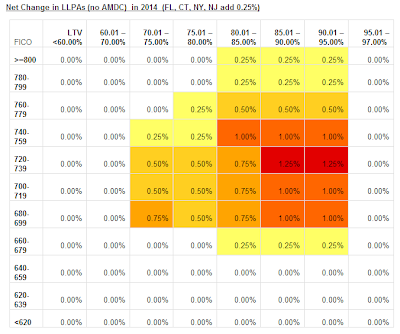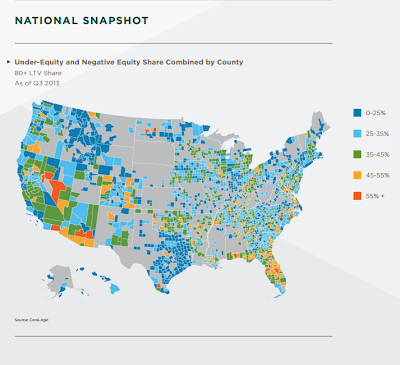Vital Statistics:
|
Last
|
Change
|
Percent
|
|
|
S&P Futures
|
1782.3
|
2.0
|
0.11%
|
|
Eurostoxx Index
|
2961.3
|
-17.4
|
-0.59%
|
|
Oil (WTI)
|
97.44
|
0.0
|
-0.04%
|
|
LIBOR
|
0.244
|
0.002
|
0.62%
|
|
US Dollar Index (DXY)
|
80.13
|
0.059
|
0.07%
|
|
10 Year Govt Bond Yield
|
2.87%
|
-0.01%
|
|
|
Current Coupon Ginnie Mae TBA
|
104.7
|
0.0
|
|
|
Current Coupon Fannie Mae TBA
|
103.4
|
0.1
|
|
|
RPX Composite Real Estate Index
|
200.7
|
-0.2
|
|
|
BankRate 30 Year Fixed Rate Mortgage
|
4.48
|
Markets are
little changed this morning ahead of the start of the FOMC meeting. Consumer
Prices were unch'd.
The GSEs are
planning on reducing
the upper limits sometime
next fall. They are thinking of dropping the high cost ceiling from
625k to 600k and the overall ceiling from 417k to 400k. They are inviting
public comment. Setting new purchase limits "furthers the goal of
contracting the market presence of Fannie Mae and Freddie Mac gradually over
time, one of the key objectives of FHFA's strategic plan."
Fannnie Mae and
Freddie Mac also released their new pricing adjustments today, (Fannie is here, Freddie
is here) which increases costs for borrowers in 2014. The first part is a
g-fee increase of 10bp. The second is a series of LLPAs to better reflect credit
risk. Note the Adverse Charge goes away for all states except CT, FL, NY, and
NJ. However, when you include
the new LLPAs, conforming loan rates are going up. Mortgage News Daily put
out this handy chart showing the new adjustments. Note that these are not the
actual adjustments - they are the change in adjustments. Note that higher LTV
loans with FICOs over 680 are getting socked.

Toss
in the potential effects of QE tapering and conforming loans just got a lot
more expensive. LOs get ready for this new pricing regime.
A
total of 791,000 homes returned to positive equity in the third quarter, according
to CoreLogic. This leaves a total of 6.4 million homes (or about 13% of all
mortgaged homes) with negative equity. This compares to 7.2 million homes (or
14.7%) a year ago. You can see the distribution of negative equity MSAs in the
chart below:
The
budget deal is looking more
and more likely to pass the Senate. That doesn't necessarily mean smooth
sailing ahead - Republican lawmakers who are angry about the budget deal are spoiling
for a fight over the debt
ceiling. CNBC also has a lay of
the land. The big strategic question for the GOP remains obamacare - if it
continues to flail and have issues, do Republicans go along with a debt ceiling
increase for fear of changing the subject, or would they view this as an
opportunity to slay the unpopular ACA
dragon once and for all?
When
people think of Detroit, they often think of the hapless Lions, but also the
Packard Plant, which went dormant in 1956 and is ruins remain a testament to
urban decay and is a symbol of Rust Belt misery. It
just got bought for $405,000. He plans to revitalize Detroit's East Side.
Good luck with that...
Brent Nyitray, CFA
Director of Capital Markets
iDirect Home Loans
National Asset Direct
Dellacamera Capital Management
1010 Washington Blvd, 6th Floor
Stamford, CT 06901
203-817-3614 (w)






